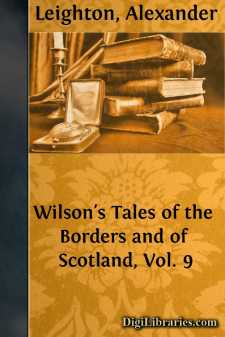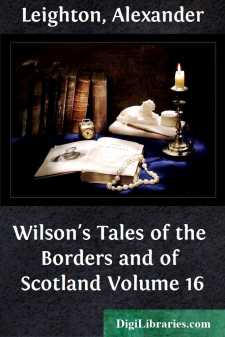Categories
- Antiques & Collectibles 13
- Architecture 36
- Art 48
- Bibles 22
- Biography & Autobiography 813
- Body, Mind & Spirit 142
- Business & Economics 28
- Children's Books 17
- Children's Fiction 14
- Computers 4
- Cooking 94
- Crafts & Hobbies 4
- Drama 346
- Education 46
- Family & Relationships 57
- Fiction 11829
- Games 19
- Gardening 17
- Health & Fitness 34
- History 1377
- House & Home 1
- Humor 147
- Juvenile Fiction 1873
- Juvenile Nonfiction 202
- Language Arts & Disciplines 88
- Law 16
- Literary Collections 686
- Literary Criticism 179
- Mathematics 13
- Medical 41
- Music 40
- Nature 179
- Non-Classifiable 1768
- Performing Arts 7
- Periodicals 1453
- Philosophy 64
- Photography 2
- Poetry 896
- Political Science 203
- Psychology 42
- Reference 154
- Religion 513
- Science 126
- Self-Help 84
- Social Science 81
- Sports & Recreation 34
- Study Aids 3
- Technology & Engineering 59
- Transportation 23
- Travel 463
- True Crime 29
Alexander Leighton
Alexander Leighton was a Scottish physician and pamphleteer known for his controversial writings during the 17th century. He authored "The Appeal of Alexander Leighton," a scathing critique of the Church of England's hierarchy and practices, which resulted in his arrest and subsequent brutal punishment by King Charles I's court. Leighton's writings and persecution became emblematic of the era's religious and political tensions in England.
Author's Books:
Sort by:
THE CRIPPLE; OR, EBENEZER THE DISOWNED. It is proverbial to say, with reference to particular constitutions or habits of body, that May is a trying month, and we have known what it is to experience its trials in the sense signified. With our grandmothers too, yea, and with our grandfathers also, May was held to be an unlucky month. Nevertheless, it is a lovely, it is a beautiful month, and the...
more...
"The black-eyed Judith, fair and tall,Attracted the heir of Riccon Hall.For years and years was Judith known,Queen of a wild world all her own;By Wooler Haugh, by silver Till,By Coldstream Bridge, and Flodden Hill:Until, at length, one morn, when sleetHung frozen round the traveller's feet,By a grey ruin on Tweedside,The creature laid her down and died."—Border Ballad. More than three...
more...
THE VACANT CHAIR.[1] [1] Our commencement with "The Vacant Chair"—the first written of the Tales of the Borders—is not inconsistent with our principle of selection in this edition, which is to distribute the contributions of the authors, so as to secure variety without any view to an early exhaustion of the best of the Tales.—Ed. You have all heard of the Cheviot mountains. They are a...
more...
How far the term, "A Leveller," is provincial, or confined to the Borders, I am not certain; for before I had left them, to become as a pilgrim on the earth, the phrase had fallen into disuse, and the events, or rather the cause which brought it into existence, had passed away. But, twenty-five or even twenty years ago, in these parts, there was no epithet more familiar to the lips of every...
more...
Thirty years ago, there dwelt an old man named Simon Cockburn, who followed the avocations of parish teacher and precentor. Every Saturday afternoon, after he had washed his hands from the labours of the week, he went down to the public-house of the village in which he dwelt, and took his seat by the parlour window or fire (according as it was summer or winter), to read the newspaper, and see, as he...
more...
THE DOOM OF SOULIS."They roll'd him up in a sheet of lead—A sheet of lead for a funeral pall;They plunged him in the caldron red,And melted him—lead, and bones, and all."—Leyden. A Gazetteer would inform you that Denholm is a village beautifully situated near the banks of the Teviot, about midway between Jedburgh and Hawick, and in the Parish of Cavers; and perhaps, if of modern...
more...
WILSON'S TALES OF THE BORDERS, AND OF SCOTLAND. Notwithstanding the shortness of their days, the bitterness of their frosts, and the fury of their storms, December and January are merry months. First comes old Christmas, shaking his hoary locks, belike, in the shape of snow-drift, and laughing, well-pleased, beneath his crown of mistletoe, over the smoking sirloin and the savoury goose. There is...
more...
There is no feeling more strongly or more generally implanted in the human breast, than man's love for the place of his nativity. The shivering Icelander sees a beauty, that renders them pleasant, in his mountains of perpetual snow; and the sunburned Moor discovers a loveliness in his sultry and sandy desert. The scenes of our nativity become implanted on our hearts like the memory of undying...
more...
THE WIDOW OF DUNSKAITH."Oh, mony a shriek, that waefu' night,Rose frae the stormy main;An' mony a bootless vow was made,An' mony a prayer vain;An' mithers wept, an' widows mournedFor mony a weary day;An' maidens, ance o' blithest mood,Grew sad, and pined away." The northern Sutor of Cromarty is of a bolder character than even the southern one—abrupt, and...
more...
In the year 1785, a young and beautiful woman, whose dress and features bespoke her to be a native of Spain, was observed a few miles beyond Ponteland, on the road which leads to Rothbury. She appeared faint and weary; dimness was deepening over the lustre of her dark eyes, and their glance bespoke anxious misery. Her raiment was of the finest silk; but time had caused its colour to fade; and it hung...
more...











